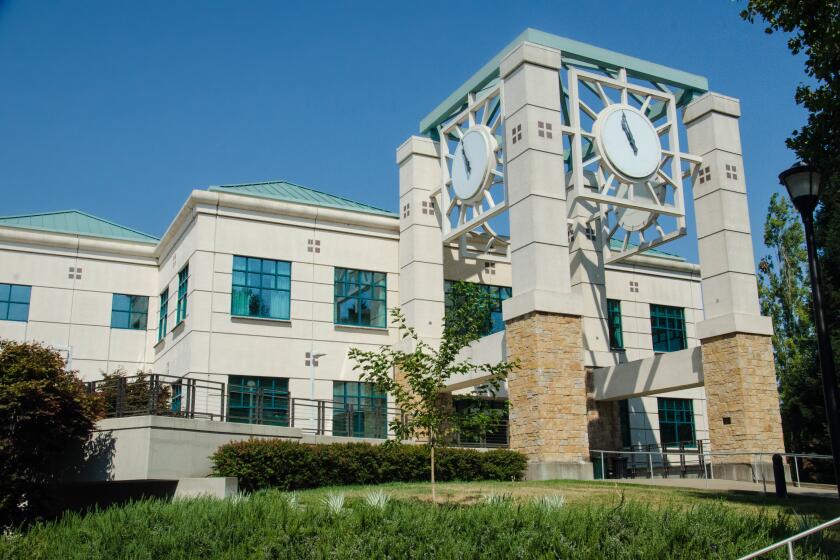CSU didn’t investigate claims that Fullerton president inappropriately touched students
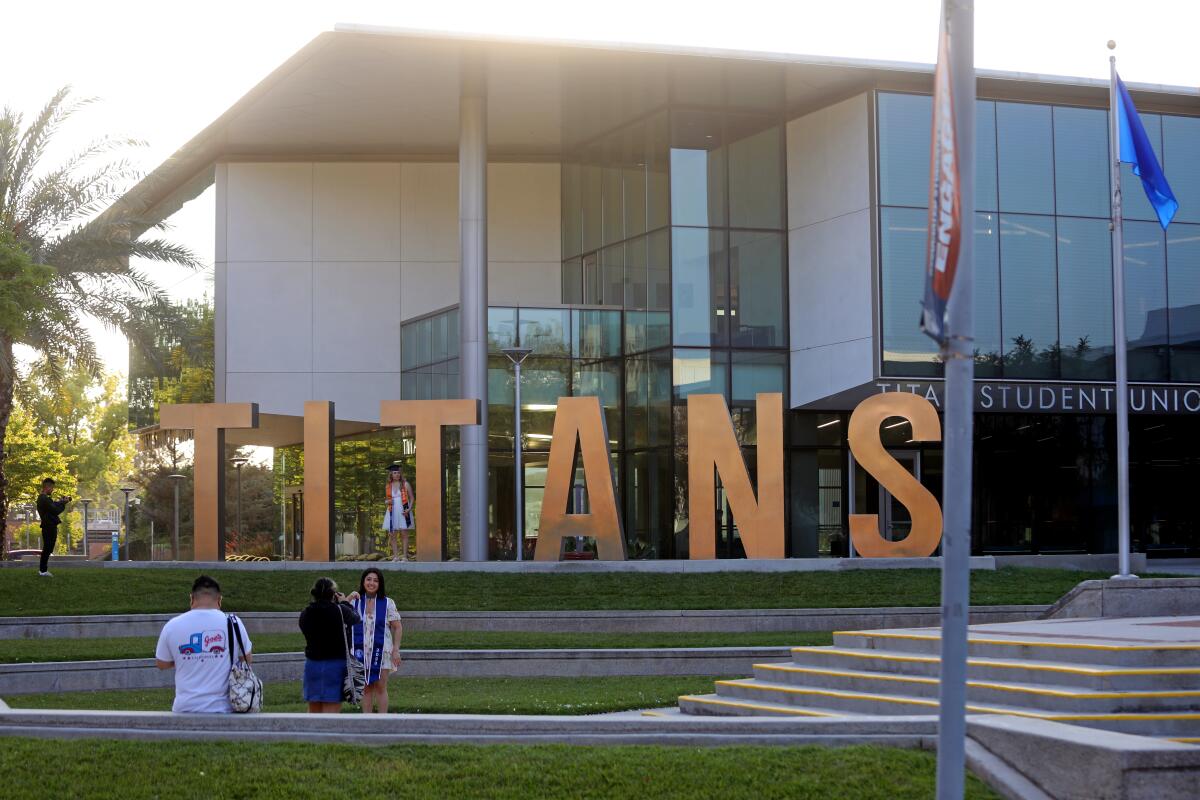
- Share via
California State University officials were notified about reports accusing the Fullerton campus president of inappropriately touching students but never launched an investigation, according to internal records and statements.
The first report, made in August 2019 to the Cal State Fullerton campus, accused President Framroze “Fram” Virjee of hugging a student and kissing her forehead, making “her feel very uncomfortable.”
Two other reports, also made to the campus, involved separate incidents while Virjee gave a tour of the school one day in November 2021. One alleged that “Virjee attempted multiple times to force himself upon” a student, touching her and trying to hug her, despite her objections. The other accused the president of touching a student’s arm and rubbing her back “without her consent” — behavior that she and a witness agreed was “unacceptable.”
The campus official in charge of enforcing sexual harassment policy “assessed the information” and determined that “the alleged conduct at face value did not violate university policy,” CSU officials said in a statement. An investigation was unwarranted, and the campus official did not alert the chancellor’s office, according to the statement. The official followed CSU policy, the statement said.
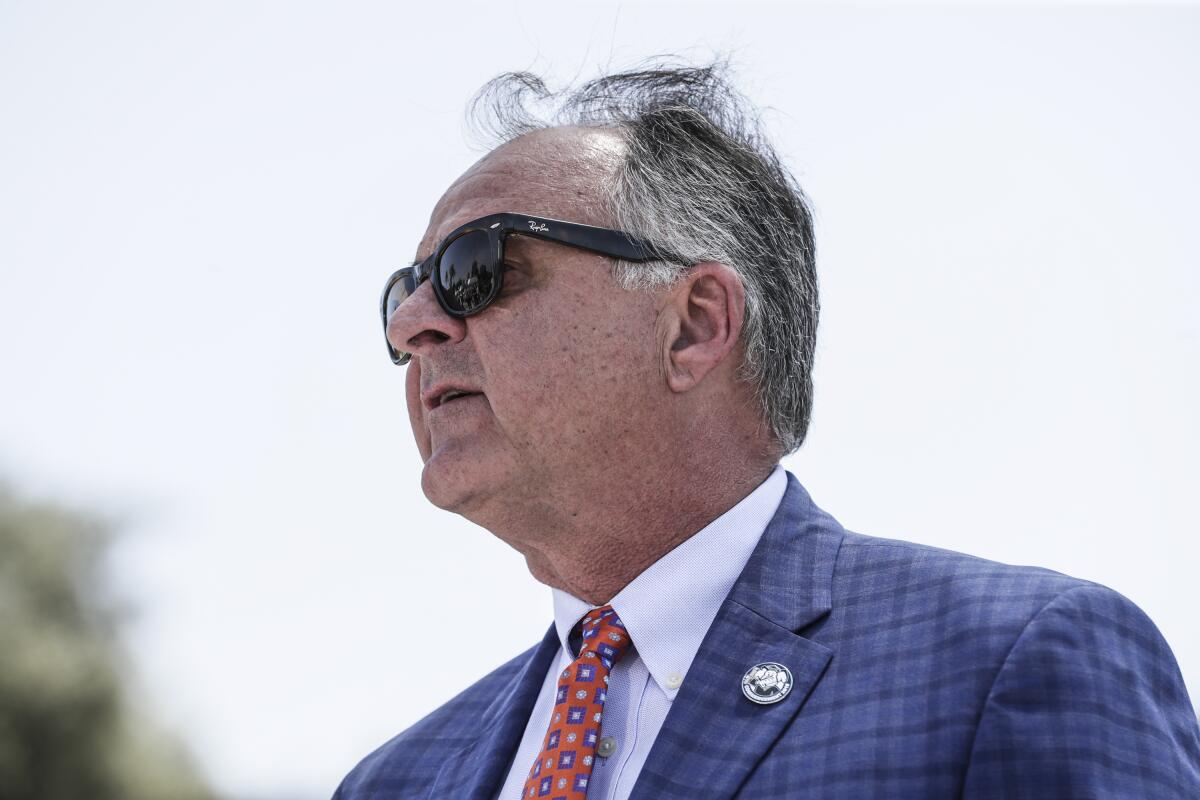
The reports were submitted by campus employees who provided “unverified and unsubstantiated” allegations, according to the statement. The campus Title IX official sent emails to each of the students involved explaining how to file a formal complaint with the chancellor’s office and offering to help if they wished to do so, a CSU spokesperson said. The campus official met with one student who declined to move forward with an investigation; the others did not respond to emails sent to their school and personal accounts, according to CSU.
Experts who reviewed the records for The Times said the reports should have been sent to the chancellor’s office and investigated by parties outside the university because they involved the most powerful official on campus.
“When presidents are involved, there’s no way it should be done on campus,” said Sharon Reiter, a former associate vice president at Cal Poly Pomona who oversaw sexual harassment investigations before retiring in 2020. “If something comes down and it’s not in his favor, you’re in his crosshairs … potentially.”
CSU officials said a campus employee told the chancellor’s office about the reports in early 2022. The officials did not respond to questions by Times reporters seeking details on why the notification was made and who was informed. The chancellor’s office took no action to review the accusations or contact the students, the officials said.
Recent revelations about how California State University handled sexual harassment and workplace retaliation complaints have rocked the nation’s largest four-year public university system.
Virjee, who has announced that he is retiring in July, said he did nothing wrong and was not made aware of the reports and their “inaccurate descriptions” until The Times asked for the records last year.
Had he been told of the reports when they were made, he said in a statement, he would have been able “to clarify what occurred from my perspective and, most importantly, to take steps to make sure that all involved were okay, which would have been my primary concern.”
At no time in his CSU career, Virjee added, “have I ever been the subject of any verified or substantiated reports of misconduct.”
In a statement, CSU interim Chancellor Jolene Koester lauded Virjee as a leader who “has excelled” as a president and “conducted himself with integrity.” For more than three decades, she said, he has overseen hundreds of training courses on sexual harassment and championed diversity, equity and social justice.
CSU initially refused to make the reports about Virjee public but relented after The Times threatened legal action.
CSU is grappling with how it handles reports of sexual harassment, sexual misconduct and retaliation across its 23 campuses.
The previous chancellor, Joseph I. Castro, last year became entangled in a controversy over his handling of sexual harassment and retaliation reports against a top administrator when he was president of Fresno State.
Amid public outcry, a group of campus presidents that included Virjee met with a top aide to California Assembly Speaker Anthony Rendon, saying they had lost confidence in Castro, according to a spokeswoman for the lawmaker. Rendon is a Fullerton alumnus and sits on the CSU board of trustees. Days later, Castro announced his resignation.
Since then, Times investigations have found inconsistencies in the way reports of sexual misconduct are handled by the nation’s largest public four-year university system and have detailed how accusations of wrongdoing against high-ranking men were resolved in various ways. Cases included the husband of a campus president who was not formally investigated for alleged sexual harassment and a vice president who was not disciplined after officials concluded that he had violated CSU sexual harassment policy.
The chancellor and trustees have declined repeated requests from The Times over the past year seeking interviews to discuss how the system has dealt with sexual harassment and other wrongdoing.
The reports from the Fullerton campus are the first records to publicly surface in which a CSU president is accused of inappropriately touching students.
Virjee previously served in the chancellor’s office as general counsel for California State University and was charged with improving how the system handled sexual harassment and sexual misconduct allegations. He has been president of Cal State Fullerton since 2018.
In the Aug. 30, 2019, report, a Cal State Fullerton employee said a student recounted that she had an encounter with Virjee that week while working at an information booth.
“President Virjee gave [the student] a hug and kissed [her] on the forehead,” the report said.
The report said the student “stated that this interaction made her feel very uncomfortable” and that she “does not want to be around President Virjee after what happened.”
The employee who wrote the report sent it to her supervisor, and it was forwarded to Sarah Bauer, the school’s director of Title IX and gender equity. Title IX is a federal law prohibiting sex discrimination, and many CSU employees are required to report such allegations.
Virjee said he does not recall that encounter, noting that it happened four years ago and that he deals with thousands of students each year.
“If I ever made anyone feel uncomfortable, that certainly was not my intent,” he said.
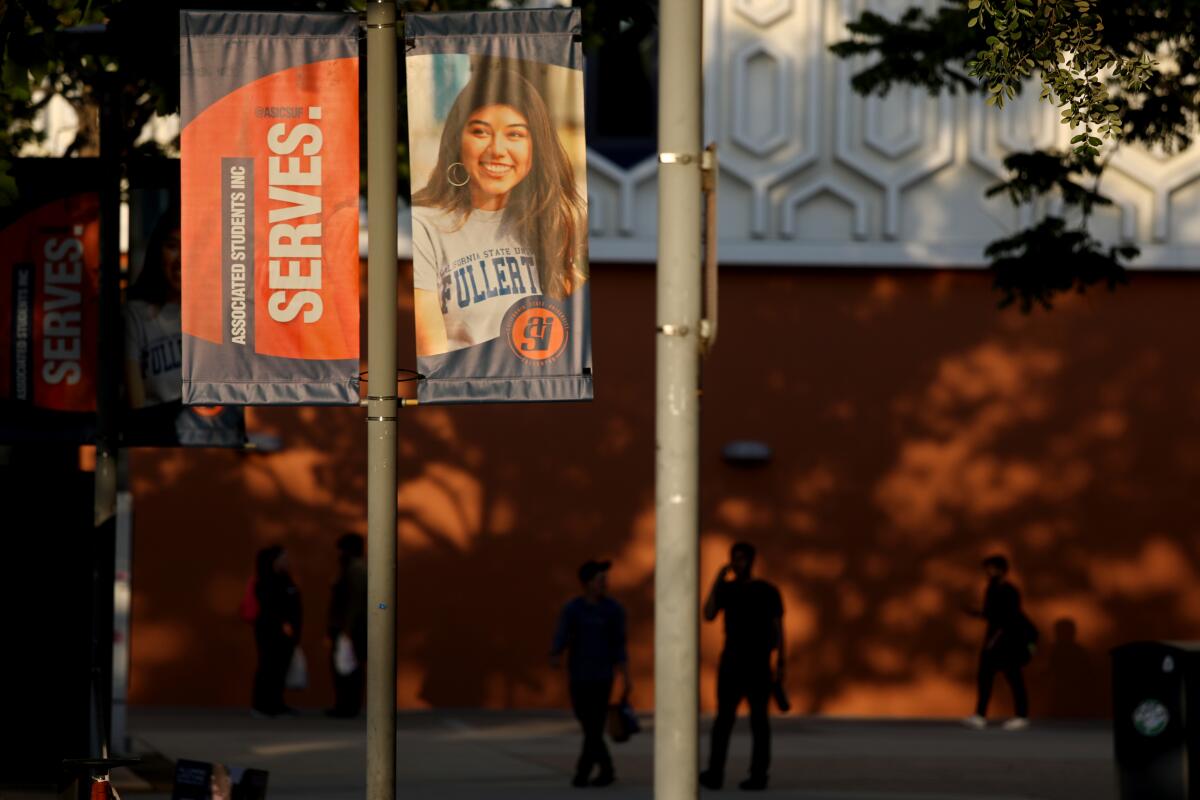
The chancellor’s office said it was inaccurate to describe the allegations in the three reports as “sexual harassment.”
“Until reports are investigated and any allegations sustained, we describe them as reports relating to potential policy violations,” a spokesperson said.
But both 2021 reports, which were sent to Bauer’s office, described the allegations as “sexual harassment.”
One says Virjee showed up in the school’s Titan Dreamers Resource Center with several officials, including former Assemblymember Jose Medina, who chaired the Assembly’s higher education committee.
“Virjee rushed to one of the students … and touched her back without consent. He also rubbed her back and touched her arm for a couple of seconds,” the employee reported, adding, “I noticed that the student froze and did not say anything.”
Afterward, according to the report, the student came to the employee’s office and “mentioned the discomfort she felt when Virjee rushed to her side and touched her without her consent.”
The student, as well as another student listed as a witness, “agreed that this type of behavior is unacceptable and agreed to be mentioned in this report,” the employee said.
CSU officials redacted the names of students, witnesses and the employees who filed the reports.
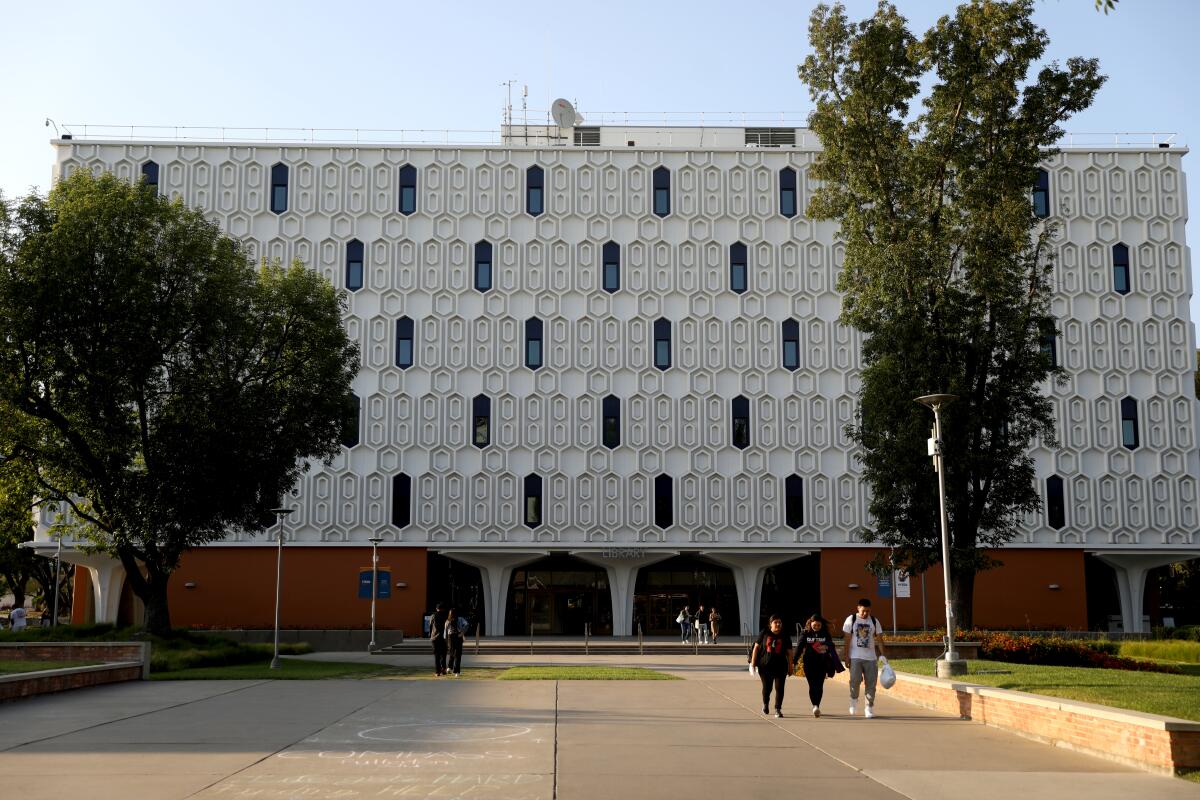
Virjee said he entered the center with the group and stood next to a student who was eating and seemed startled that he and other officials had shown up.
“My hand may have touched the student’s shoulder or arm as I introduced her to members of this group, but nothing more than that happened,” he said. “If I made any contact with the student, it was only to show support.”
The other report alleged that “Virjee attempted multiple times to force himself upon” a student at the African American Resource Center. The student “verbally declined to engage in a hug and even indicated with her hands that she did not want to be touched,” according to the report.
Virjee, according to the report, “ignored her signals and verbal rejections and still engaged in physical contact with her.”
The report listed the names of three women as witnesses to the incident at the African American Resource Center.
Virjee said three students were in the center when he arrived with Medina and others as part of the campus tour.
“Two of them knew me and greeted me with a friendly hug,” Virjee said, adding that the third student asked “if she didn’t also deserve a hug.”
He said he hugged her and saw her again as the group left the center.
“Feeling bad that I had not acknowledged her at the outset in the first greeting, I offered her a hug goodbye,” Virjee said. “She teased back something to the effect of ‘Not on your life.’ We then exchanged a quick hug, and I left with the group.”
Virjee said his interactions with the students in both centers took place in a matter of moments and that “it was never my intention to make anybody feel uncomfortable.”
Medina told The Times that he did not witness anything inappropriate during the tour.
Without interviewing any witnesses, the Title IX officer “questioned the credibility” of the 2021 reports, which alleged misconduct in public places while Virjee was giving the tour. No other individuals came forward to report misconduct during the tour, the statement said. System officials said the Title IX officer determined that for all three reports, “even if true, the reported conduct would not be considered severe or pervasive, as defined in CSU policy.”
Women and trans and nonbinary cadets at Cal State University Maritime Academy describe a pervasive culture of misogyny, sexual abuse and harassment.
CSU officials said Bauer, the Title IX officer, declined to comment for this report.
A spokesperson said the university system’s policy requires reaching out to students to offer support “and empower[ing] individuals to pursue complaints without depriving them of agency to determine how they would like to proceed.”
Under CSU’s policy, officials could have launched an investigation based on factors such as a “power imbalance” between the person accused and the accuser and whether there have been “multiple or prior reports of misconduct” against the same person.
Title IX experts who reviewed the reports at the request of The Times said Cal State Fullerton’s handling of the allegations was problematic in at least two respects. The accusations should have been forwarded promptly to the chancellor’s office to avoid campus employees having to decide how to deal with accusations against the university’s top official, and CSU should have launched an investigation to determine the veracity of the claims, especially given the similarity of the three reports, the experts said.
Castro, who was CSU chancellor when the 2021 reports were made, said he was not told about them.
“I should have been informed,” Castro told The Times, adding that he would have “immediately gone to the Board of Trustees with a recommendation to investigate the complaints and to place the president on leave while the investigation was completed.”
The fear of blowback from accusing a powerful campus figure of wrongdoing can stop people from requesting an investigation.
For example, after accusations of sexual harassment were made against the husband of Sonoma State’s former president, one accuser declined to go forward with an investigation because she feared retaliation, she told The Times last year.
The accusations were brought forward by campus officials on behalf of several women and were reported directly to the chancellor’s office. A systemwide coordinator spoke to the women but did not formally investigate.
In a background interview last year, a CSU administrator explained that the Sonoma State accusations were handled by the chancellor’s office because “we’re not going to have the campus Title IX coordinator investigate allegations against the president or the president’s spouse.”
In response to the complaints, Castro barred the husband from visiting the campus, according to a letter from the chancellor’s office.
In the Fullerton case, experts said, CSU officials from outside the campus should have reviewed the reports and determined how to respond.
“Even if ... it doesn’t arise to a Title IX violation, that doesn’t mean they can’t take other actions,” said Shiwali Patel, director of justice for student survivors and senior counsel for the National Women’s Law Center.
More to Read
Sign up for Essential California
The most important California stories and recommendations in your inbox every morning.
You may occasionally receive promotional content from the Los Angeles Times.
